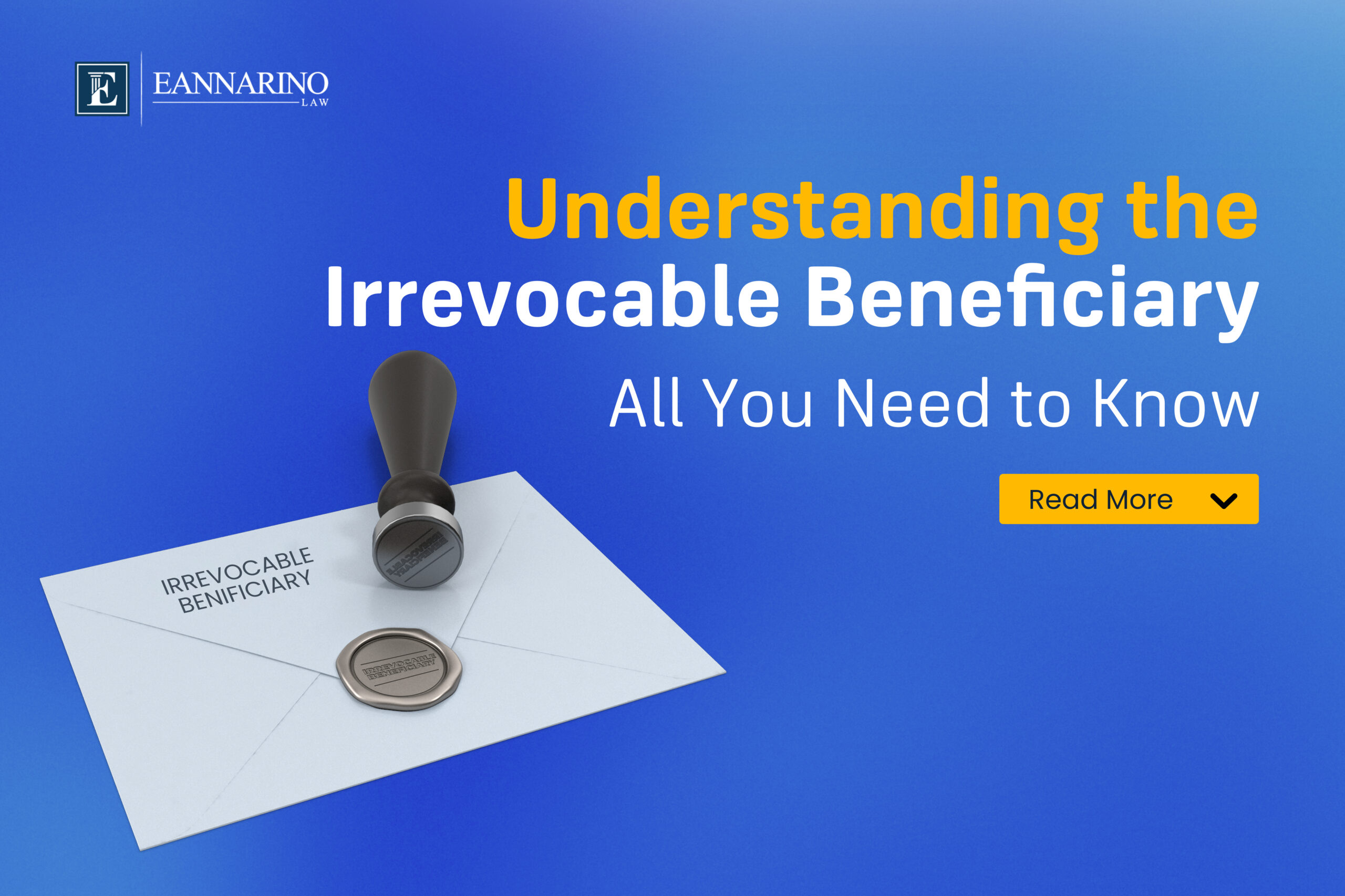
In estate planning, deciding who receives your assets is crucial. The concept of an irrevocable beneficiary plays a significant role. An irrevocable beneficiary is someone designated to inherit specific assets, like a life insurance policy or trust, with special legal protections. But an irrevocable beneficiary designation comes with complexities that deserve careful consideration. This post unpacks the key aspects of irrevocable beneficiaries to help you make informed decisions for your estate planning needs.
Understanding Irrevocable Beneficiaries
Irrevocable beneficiaries are unique because, once named, you, as the policyholder or grantor, cannot remove or change them without their consent. This stands in stark contrast to a revocable beneficiary, where you retain the freedom to make alterations as needed. The key feature of an irrevocable beneficiary is their vested rights to the designated assets.
When Are Irrevocable Beneficiaries Used?
You might wonder why anyone would choose an irrevocable beneficiary with such limitations. There are actually compelling situations where this designation makes sense. Let’s explore a few examples where you might consider naming an irrevocable beneficiary:
Divorce Settlements
One common scenario involves divorce settlements. A divorcing couple might agree to maintain a life insurance policy for their children, with the children designated as irrevocable beneficiaries. This arrangement ensures the children will receive the death benefit, regardless of any future changes in the relationship between the parents. This provides financial security for the children.
Protecting Assets
Irrevocable beneficiaries can also be valuable for asset protection. By assigning assets to an irrevocable trust with a named irrevocable beneficiary, you essentially remove those assets from your personal ownership. This means they are shielded from creditors in case of legal issues or financial difficulties. This is a strategy often used to protect family assets for future generations.
Estate Planning Advantages
Irrevocable trusts with named beneficiaries can offer significant advantages when navigating estate taxes. By placing assets in an irrevocable trust, you can potentially reduce your taxable estate. This helps minimize the potential tax burden on your heirs after your death, allowing for a smoother transfer of wealth.
Illustrative Example
Imagine you have a sizable life insurance policy and designate your spouse as an irrevocable beneficiary. If you were to divorce later on and wish to change the beneficiary to your new spouse or your children, you would require your former spouse’s consent. Without their agreement, the death benefit would still go to them, even if that’s not your desired outcome. This highlights the importance of careful consideration when naming an irrevocable beneficiary.
Revocable vs. Irrevocable Beneficiaries: What’s the Difference?
The terms “revocable” and “irrevocable” sound intimidating, but understanding them is vital when crafting your estate plan. While both involve designating individuals to inherit assets, their levels of control and flexibility differ considerably. To put it simply, a revocable beneficiary is changeable while an irrevocable one isn’t. But, there’s more nuance to each.
Revocable Beneficiary
Think of a revocable beneficiary as a flexible arrangement. You, as the policyholder, retain full control over the named beneficiary and can make changes at your discretion, without their knowledge or consent. Imagine a scenario where you name your child as the beneficiary on your life insurance policy while they’re young. Later on, they establish their own financial stability.
You might decide to change the beneficiary to your spouse or a grandchild instead. You have that freedom with a revocable beneficiary, making it adaptable to changing life circumstances.
Irrevocable Beneficiary
With an irrevocable beneficiary, the decision is far more permanent. Once you make that designation, it’s binding, and any changes require the beneficiary’s consent. Consider a trust set up for a child with special needs. Naming them as an irrevocable beneficiary provides ongoing financial support and protection for their care, even in situations like divorce or other life changes where control over assets might be contested.
Table Summarizing Revocable vs. Irrevocable
| Feature | Revocable Beneficiary | Irrevocable Beneficiary |
| Changeability | Policyholder can change without beneficiary’s consent. | Policyholder needs beneficiary’s consent for changes. |
| Control | Policyholder has complete control over the designation. | Beneficiary has vested rights, limiting policyholder’s control. |
| Flexibility | High flexibility, adaptable to changing life circumstances. | Low flexibility, best suited for situations requiring permanence. |
| Common Use Cases | General beneficiary designations for life insurance, wills, etc. | Divorce settlements, trusts for dependents with special needs, asset protection. |
Common Misconceptions about Irrevocable Beneficiaries
Misunderstandings surround the idea of an irrevocable beneficiary. Let’s tackle some common myths that might be influencing your perception. This will help ensure you’re making estate planning decisions based on accurate information.
Myth 1: A Spouse is Always an Irrevocable Beneficiary
Many assume their spouse automatically becomes an irrevocable beneficiary upon marriage. This is inaccurate. Typically, spouses are named as primary beneficiaries on life insurance policies or retirement plans. These designations, however, are often revocable by default.
It takes explicit action to make a spouse an irrevocable beneficiary. Such a move requires careful planning and legal documentation. It is not an automatic consequence of marriage.
Myth 2: Irrevocable Beneficiary Designations are Unbreakable
While challenging to alter, irrevocable beneficiary designations are not completely set in stone. The word “irrevocable” can make the arrangement seem like an impenetrable fortress, but there are exceptions. Remember, changing an irrevocable beneficiary requires their consent, adding a layer of complexity.
There are specific situations when an irrevocable beneficiary designation might be chosen, such as providing long-term support for dependents, ensuring asset protection, and fulfilling certain trust arrangements.
Let’s explore specific instances where changes may be possible.
Circumstances Permitting Change to an Irrevocable Beneficiary:
- Consent: The easiest path is if the irrevocable beneficiary agrees to the change. This must be clear, documented, and executed according to the terms of the specific policy or trust.
- Trustee’s Authority: When an irrevocable beneficiary is part of a trust, the trustee may possess specific powers. In certain situations, the trustee can change beneficiaries, but only as allowed by the terms of the trust document.
- Court Orders: In rare, typically complex situations, you can seek a court order to modify an irrevocable beneficiary designation. You would need a compelling reason that convinces the court to override the existing agreement, such as demonstrating a change in circumstances or a breach of fiduciary duty.
Keep in mind, relying solely on court intervention is risky and can involve costly legal battles. It is always best to carefully consider the implications before making an irrevocable beneficiary designation in the first place.
Contesting an Irrevocable Beneficiary: When It’s Possible
Life throws curveballs, and you may find yourself wondering whether you can challenge an irrevocable beneficiary designation. This can happen due to various reasons, such as changed family dynamics or even concerns about undue influence during the original designation. It’s a difficult process, but not always impossible.
Grounds for Contesting an Irrevocable Beneficiary:
- Undue Influence: If evidence suggests the policyholder or grantor was coerced or manipulated into naming a particular irrevocable beneficiary, it can be grounds for a challenge. This might involve situations where the beneficiary used their position of power or influence to pressure the policyholder.
- Lack of Capacity: When the policyholder or grantor lacked the mental capacity to understand their actions at the time of making the irrevocable beneficiary designation, a contest can arise. This means they were not of sound mind and did not fully comprehend the consequences of their decision.
- Fraud or Misrepresentation: A beneficiary obtaining their designation through deceptive means or false pretenses can be challenged in court. Think of a beneficiary providing misleading information to influence the policyholder’s decision, such as misrepresenting their relationship or intentions.
- Breach of Fiduciary Duty: If a trustee mismanages assets or acts against the beneficiary’s interests in an irrevocable trust, this can trigger legal action. The trustee has a legal obligation to act in the best interests of the beneficiary, and failing to do so can be grounds for removal or legal action.
Keep in mind that contesting an irrevocable beneficiary often requires a significant amount of evidence. Cases often involve emotional distress and strained family relations, so it’s wise to seek legal advice from an estate planning attorney before pursuing such a challenge.
Navigating Irrevocable Beneficiaries: Seeking Legal Expertise
Given the complexities of irrevocable beneficiary designations, consulting with an experienced attorney specializing in estate planning is highly advisable. They’ll offer tailored advice based on your unique situation, financial goals, and long-term objectives. Remember, they guide you through legal technicalities and can even mediate discussions with existing irrevocable beneficiaries.
Thinking through your long-term objectives and weighing the pros and cons of irrevocable beneficiary designations are vital to create a well-rounded estate plan that aligns with your wishes. With a thorough understanding of irrevocable beneficiaries, you can approach your estate planning with more confidence.
FAQs About irrevocable beneficiary
Why Would Someone Choose an irrevocable beneficiary?
An irrevocable beneficiary helps ensure assets go to a specific individual or entity, offering a higher level of control over inheritance. Common reasons include protecting the interests of minor children, particularly in the case of divorce or separation. Other reasons include securing assets for dependents with special needs, shielding assets from potential creditors in cases of lawsuits or financial hardship, or potentially reducing estate taxes by strategically distributing assets.
What is the Difference Between a Revocable and irrevocable beneficiary?
A revocable beneficiary can be changed or removed by the policyholder at any time without their consent. This offers flexibility to adjust your estate plan as your life changes. In contrast, an irrevocable beneficiary has vested rights, meaning you can only change their status with their agreement. This makes the designation more permanent, providing a higher level of assurance that the assets will go to the intended recipient.
Is a Spouse an irrevocable beneficiary?
Typically, a spouse is not automatically an irrevocable beneficiary. They might be named as a primary beneficiary, but this designation is usually revocable unless explicit action was taken to make it irrevocable. It’s important to review your beneficiary designations with your insurance company or financial institution to confirm the type of beneficiary you’ve designated.
Can an irrevocable beneficiary Be Contested?
Although challenging, contesting an irrevocable beneficiary is possible in limited circumstances. These situations include evidence of undue influence, lack of capacity on the part of the grantor or policyholder at the time of designation, fraud, or a breach of fiduciary duty. Contesting an irrevocable beneficiary designation often requires strong legal grounds and compelling evidence.
Conclusion
While an irrevocable beneficiary may sound complex, it is a powerful tool in the realm of estate planning. Understanding their implications, benefits, and limitations can guide you towards a more secure and effective approach that protects both your assets and your loved ones’ futures. Always remember to seek guidance from an experienced estate planning attorney to navigate these complexities effectively.



